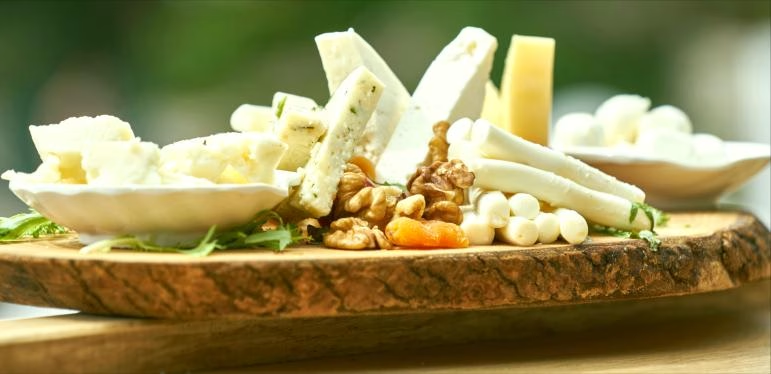Common cheeses include fresh cream cheese, mascarpone cheese, white mold cheese, washed cheese, and goat cheese. What are the differences in production and flavor between these cheeses?
Types of Natural Cheese
Many people know that cheese is categorized by type, such as “white mold cheese” and “hard cheese.”
Natural cheese is generally divided into seven types.
Cheese classification varies by country and cheese organization.
Fresh Cheese
Natural cheese also has unaged varieties.
Fresh cheese refers to cheese that is not aged in the final stage of the production process. Some also call it “baby cheese.” After the milk solidifies, the water is removed and salty or sweetened. The final step, depending on the preparation, can create a variety of fresh cheeses, ranging from smooth and creamy to firm.
Because this cheese is unaged, it has a refreshing, tart flavor and a very refreshing taste. Because of its simple preparation and lack of processing, the freshness and natural flavor of the ingredients are crucial to its quality.
Brocco cheese is made by first heating the whey before adding milk. Once it solidifies, it is scooped out through a strainer with a spoon.
White Mold Cheese
A cheese with a delicate and smooth flavor, its rind covered with white mold.
The traditional method involves spraying the cheese with white mold after it is formed, but now Penicillium camemberti is added to the milk. Another method involves aging the cheese in salt water infused with white mold.
Aging progresses gradually from the outside in, as the cheese’s surface browns, the flesh softens, and the hard core gradually disappears.
Products made with pasteurized milk are characterized by a delicate and smooth flavor. Products made with raw milk, on the other hand, are characterized by a flavor that develops with aging, developing a deeper, more complex flavor and a more intense aroma.
To develop the characteristic flavor of Normandy’s Comémbert cheese, it must be aged for at least 21 days.
Washed Rind Cheese
Washing the surface with salt water and alcohol brings out its unique aroma.
Washing the surface of cheese with salt water or local wine, beer, or other alcoholic beverages before aging is called “washing the rind.”
This allows the moisture-loving bacteria Brevibacterium linens (a type of Bacillus natto) to grow and mature, preventing the growth of bacteria and mold while also developing a rich flavor.
Washed rind cheese has a distinct aroma, which may lead some to believe it has a strong flavor, but the cheese inside actually has a rich, profound flavor. Removing the rind and consuming only the cheese inside results in a milder flavor and can be enjoyed with confidence.
Munster cheese aging room. Washing the cheese twice a week with salt water allows the rind to gradually turn an orange color.
Goat (Sheep) Cheese
Chevre is made from goat’s milk, while Brebis is made from sheep’s milk.
“Chevre” means “sheep” in French, and cheese made from its milk is also called “Chevre.” Goat cheese is often small, covered in charcoal ash, or has a distinctive appearance, making it quite distinctive. Freshly made, it is pure white, without a rind, and has a refreshingly sour flavor.
As it matures (as the moisture gradually evaporates), its umami flavor intensifies, and the flavor becomes rich and robust. If certain conditions are met, mold in various colors, such as blue, gray, or yellow, will form on the surface of the cheese, accompanied by a moldy aroma.
Sheep cheese (Brebis) is made from sheep’s milk and is not included in the various cheese types, such as fresh, white mold, blue vein, washed skin, semi-hard, or hard. It is primarily made into small to medium-sized cheeses. Sheep milk has a higher fat content than cow or goat milk, so many sheep milk cheeses have a rich flavor and a good texture.


Leave a Reply